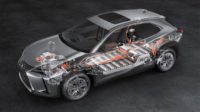QUEBEC, Canada—Lion Electric (Lion), which manufactures all-electric trucks and buses, recently announced its plans to build a battery manufacturing plant and innovation center here. Utilizing cutting-edge technology, the factory is planned to begin operations in early 2023 and will produce battery packs and modules made from Lithium-ion cells.
Construction is projected to break ground over the next few months at a location to be confirmed in the near future and create a projected 135 direct jobs, as well as hundreds more indirect regional jobs. This new facility will become an essential link in a chain of specialized suppliers essential to the electrification of transportation.
The project and its development represent an investment of approximately $185 million Canadian dollars (CAD) by Lion, which will receive support by the federal and provincial governments of approximately $100 million CAD ($50 million CAD each). With the construction of the plant, Lion hopes to see a considerable reduction in the cost of its vehicle manufacturing while ensuring control and optimization of a key component of its vehicle supply chain.
With a planned yearly production capacity of 5 gigawatt-hours in battery storage, Lion will be able to electrify approximately 14,000 medium and heavy-duty vehicles annually. The manufacturing plant and innovation center will offer Lion many strategic advantages, including a reduction in its battery system production cost as well as a stable line of procurement of battery packs.
Highly automated, Lion's factory is projected to produce one battery module every 11 seconds and a full battery pack every 5 minutes. Lion will be the first Canadian manufacturer of medium and heavy-duty vehicles to equip itself with its own automated battery pack manufacturing capability.
Lion's innovation center will focus on research and development, with the goal of exploring and achieving new advancements in performance, range, energy capacity and the development of innovative products, and will allow the company the flexibility needed to rapidly adapt to emerging technologies.






